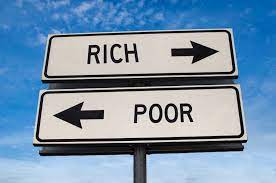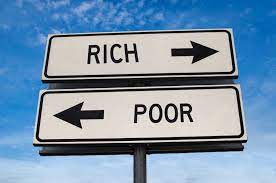
A research published recently indicated that billionaires' proportion of family wealth increased by a record amount during the epidemic, with millionaires also benefiting from Covid-19.
According to the World Inequality Report, created by a network of social scientists, billionaires possess 3.5 per cent of worldwide household wealth this year, up from little more than 2 per cent at the start of the epidemic in early 2020.
"The Covid-19 crisis has exacerbated inequalities between the very wealthy and the rest of the population," lead author Lucas Chancel said, noting that rich economies used massive fiscal support to mitigate the sharp rises in poverty seen elsewhere.
The research report draws on a range of expert studies and public domain data, with a preface written by U.S.-based economists Abhijit Banerjee and Esther Duflo, two of the trio that earned a Nobel Prize in 2019 for work on poverty.
"Since wealth is a major source of future economic gains, and increasingly, of power and influence, this presages further increases in inequality," they wrote of what they called an "extreme concentration of economic power in the hands of a very small minority of the super-rich".
The findings back up a slew of previous research, "rich lists," and other data pointing to an increase in health, socioeconomic, gender, and racial disparities during the epidemic.
This year's Forbes list of the world's billionaires contained a record-breaking 2,755 billionaires with a total fortune of $13.1 trillion, up from $8 trillion previous year. more info
According to the latest research, a larger group of 520,000 persons who make up the top 0.01 per cent richest together saw their share of global wealth rise to 11 per cent this year, up from 10 per cent the previous year.
Belonging to the top 0.01 per cent means possessing at least 16.7 million euros ($19 million) in household wealth, adjusted for purchasing power parity across currencies, according to the report.
According to analysts, some super-rich people benefitted from the movement of much of the world's economy online during lockdowns, while others simply benefited from soaring asset prices as financial markets bet on the speed and form of the global recovery.
The study also discovered that, while poverty grew rapidly in countries with less welfare coverage, strong government assistance in the United States and Europe was able to minimise at least part of that impact on lower-income people in those nations.
"This shows the importance of social states in the fight against poverty," Chancel said.
Separately, it hailed this year's agreement on a worldwide minimum corporate tax rate of 15 per cent as a possible milestone in attempts to stem a "race to the bottom" that has resulted in a halving of average business tax rates to roughly 24 per cent since the mid-1980s.
It said, however, that the agreement was faulty because the 15% floor was lower than what ordinary workers in high-income nations paid, and because it provided carve-outs and opaque arbitration options to many of the corporations involved.
(Source:www.reuters.com)
According to the World Inequality Report, created by a network of social scientists, billionaires possess 3.5 per cent of worldwide household wealth this year, up from little more than 2 per cent at the start of the epidemic in early 2020.
"The Covid-19 crisis has exacerbated inequalities between the very wealthy and the rest of the population," lead author Lucas Chancel said, noting that rich economies used massive fiscal support to mitigate the sharp rises in poverty seen elsewhere.
The research report draws on a range of expert studies and public domain data, with a preface written by U.S.-based economists Abhijit Banerjee and Esther Duflo, two of the trio that earned a Nobel Prize in 2019 for work on poverty.
"Since wealth is a major source of future economic gains, and increasingly, of power and influence, this presages further increases in inequality," they wrote of what they called an "extreme concentration of economic power in the hands of a very small minority of the super-rich".
The findings back up a slew of previous research, "rich lists," and other data pointing to an increase in health, socioeconomic, gender, and racial disparities during the epidemic.
This year's Forbes list of the world's billionaires contained a record-breaking 2,755 billionaires with a total fortune of $13.1 trillion, up from $8 trillion previous year. more info
According to the latest research, a larger group of 520,000 persons who make up the top 0.01 per cent richest together saw their share of global wealth rise to 11 per cent this year, up from 10 per cent the previous year.
Belonging to the top 0.01 per cent means possessing at least 16.7 million euros ($19 million) in household wealth, adjusted for purchasing power parity across currencies, according to the report.
According to analysts, some super-rich people benefitted from the movement of much of the world's economy online during lockdowns, while others simply benefited from soaring asset prices as financial markets bet on the speed and form of the global recovery.
The study also discovered that, while poverty grew rapidly in countries with less welfare coverage, strong government assistance in the United States and Europe was able to minimise at least part of that impact on lower-income people in those nations.
"This shows the importance of social states in the fight against poverty," Chancel said.
Separately, it hailed this year's agreement on a worldwide minimum corporate tax rate of 15 per cent as a possible milestone in attempts to stem a "race to the bottom" that has resulted in a halving of average business tax rates to roughly 24 per cent since the mid-1980s.
It said, however, that the agreement was faulty because the 15% floor was lower than what ordinary workers in high-income nations paid, and because it provided carve-outs and opaque arbitration options to many of the corporations involved.
(Source:www.reuters.com)





